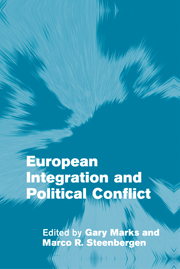Book contents
- Frontmatter
- Contents
- List of figures
- List of tables
- List of contributors
- Preface
- Introduction: Models of political conflict in the European Union
- Part I Citizens
- 1 The structure of citizen attitudes and the European political space
- 2 Potential for contestation on European matters at national elections in Europe
- 3 Don't rock the boat: expectations, fears, and opposition to EU-level policy-making
- 4 Varieties of capitalism and political divides over European integration
- Part II Political parties
- Part III Groups
- References
- Index
2 - Potential for contestation on European matters at national elections in Europe
Published online by Cambridge University Press: 22 September 2009
- Frontmatter
- Contents
- List of figures
- List of tables
- List of contributors
- Preface
- Introduction: Models of political conflict in the European Union
- Part I Citizens
- 1 The structure of citizen attitudes and the European political space
- 2 Potential for contestation on European matters at national elections in Europe
- 3 Don't rock the boat: expectations, fears, and opposition to EU-level policy-making
- 4 Varieties of capitalism and political divides over European integration
- Part II Political parties
- Part III Groups
- References
- Index
Summary
That citizens of European Union countries differ in their attitudes regarding Europe is a commonplace of political commentary. Some favor their country's membership in the EU, others oppose it. Some, while thinking that membership is generally a good thing, feel that steps toward unification have gone far enough – or even too far. Others believe that further steps should be taken.
Citizens of EU countries also differ in terms of more traditional political orientations – attitudes to the proper role of government in society, welfare provision, and other matters which have increasingly over the past half-century come to be subsumed within a single orientation towards government action, generally referred to as the left/right orientation (Lipset 1960; Lijphart 1980; Franklin, Mackie, Valen, et al., 1992).
These two orientations are often assumed to be orthogonal, with the newer pro-/anti-EU orientation cutting across the more traditional left/right orientation (see, e.g., Hicks and Lord 1998; Hooghe and Marks 1999). Our own research (van der Eijk and Franklin 1996; van der Eijk, Franklin, and van der Brug 1999; van der Brug, Franklin, and van der Eijk 2000) demonstrates that EU orientation does not currently have much impact on party choice at EU elections. Elections to the European Parliament have been described as “second-order national” elections at which the arena supposedly at issue (the European arena) takes second place to the national arena as a focus for issue and representational concerns (Reif and Schmitt 1980; Reif 1984, 1985; Marsh and Franklin 1996); and the national arena is quintessentially one in which left/ right orientations dominate.
- Type
- Chapter
- Information
- European Integration and Political Conflict , pp. 32 - 50Publisher: Cambridge University PressPrint publication year: 2004
- 183
- Cited by



